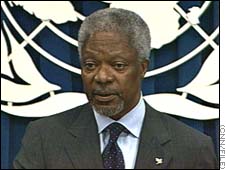 UNITED NATIONS
-- An aide to U.N. Secretary-General Kofi Annan leaked concerns that U.S.
intelligence agents had participated in U.N. weapons inspections in Iraq,
sources told CNN on condition of anonymity. UNITED NATIONS
-- An aide to U.N. Secretary-General Kofi Annan leaked concerns that U.S.
intelligence agents had participated in U.N. weapons inspections in Iraq,
sources told CNN on condition of anonymity.
The sources said the aide made telephone calls to certain reporters
on his own initiative, without instructions from Annan.
Clinton administration officials acknowledged Thursday that U.S. weapons
experts, including some from intelligence agencies, helped U.N. inspectors
search for Iraqi weapons. They said information gained during the inspections
assisted U.S. military planners but flatly denied the intelligence agents
acted as spies.
"The business of weapons of mass destruction arms control is extremely
serious and cannot be carried out by amateurs," said State Department
deputy spokesman James Foley. "The United States has sent UNSCOM (the
U.N. Special Commission) our best weapons experts, both from the government
and private organizations."
A former U.N. official told CNN that French and Russian intelligence
agencies were also involved, "with the full knowledge of senior U.N.
officials."
Administration officials have suspected Annan's aides leaked the story
to undercut chief U.N. weapons inspector Richard Butler, whose aggressive
style has led to sharp criticism from Baghdad. Administration officials
fear Annan is trying to find a reason to replace the UNSCOM inspection
team with a less intrusive body, one that would lack any U.S. involvement.
 Butler said he
expected "real answers" from a meeting with U.S. officials about
Washington's involvement in the inspections operations, scheduled for Friday. Butler said he
expected "real answers" from a meeting with U.S. officials about
Washington's involvement in the inspections operations, scheduled for Friday.
Butler denied his staff ever spied for the United States or Britain
but said he wanted U.S. officials to clarify whether "some other collection
efforts or piggybacking on us may have been taking place."
"We don't want our system misused in that way," he said.
U.N. and U.S. officials told CNN they did not know of any independent
espionage work done by Americans while they were working for UNSCOM. They
said U.S. intelligence learned about Iraqi leader Saddam Hussein's movements
and security arrangements through "cooperation" with UNSCOM,
but only as a "byproduct" of U.N. efforts to monitor programs
for weapons of mass destruction.
The sources said the U.S. Central Intelligence Agency did help UNSCOM,
at its request, to eavesdrop electronically on officers of special Republican
Guard units assigned by Hussein to both conceal his illegal weapons programs
and provide for the Iraqi leader's personal security.
Butler said he never authorized any surveillance of Hussein's communications
-- only messages that related to the National Monitoring Directorate, which
works with U.N. inspectors in searching for arms.
Concern at the United Nations that international inspections benefited
U.S. intelligence threatens to undermine the basis for the Clinton administration's
policy on Iraq. More than a year of tension between Washington and Baghdad
began in the fall of 1997 when Iraq demanded an end to U.S. participation
in the weapons inspections, charging that they were espionage operations.
Iraq's lack of cooperation with the U.N. inspectors since then culminated
in the pre-Christmas U.S. and British airstrikes on targets in Iraq.
David Ensor
|